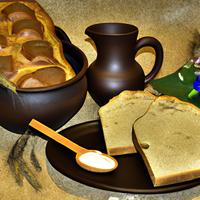
1 serving (38 grams) contains 100 calories, 3.5 grams of protein, 1.5 grams of fat, and 18.0 grams of carbohydrates.

Log this food in SnapCalorie

Nutrition Information
Calories |
625 | ||
|---|---|---|---|
% Daily Value* |
|||
| Total Fat | 9.4 g | 12% | |
| Saturated Fat | 1.9 g | 9% | |
| Polyunsaturated Fat | 0 g | ||
| Cholesterol | 0 mg | 0% | |
| Sodium | 1187.5 mg | 51% | |
| Total Carbohydrates | 112.5 g | 40% | |
| Dietary Fiber | 3.1 g | 11% | |
| Sugars | 12.5 g | ||
| protein | 21.9 g | 43% | |
| Vitamin D | 0 mcg | 0% | |
| Calcium | 125.0 mg | 9% | |
| Iron | 7.5 mg | 41% | |
| Potassium | 250.0 mg | 5% | |
* Percent Daily Values are based on a 2,000 calorie diet. Your daily values may be higher or lower depending on your calorie needs.
Food Attributes
Source of Calories
About Yeast bread
Yeast bread is a staple food made from a basic mixture of flour, water, yeast, and salt. The yeast serves as a fermenting agent, causing the dough to rise and giving the bread its fluffy texture and distinct flavor. Originating from ancient Egypt and later refined in European cuisines, yeast bread is now enjoyed across the world. Traditionally high in carbohydrates, it serves as an energy source. Nutritionally, it can offer fiber, vitamins, and minerals depending on the type of flour used. Whole-grain varieties are especially beneficial for digestive health and provide sustained energy. However, white bread made from refined flour may lack nutritional value and could contribute to spikes in blood sugar. Some versions contain added sugars or fats, which may reduce health benefits. Choosing whole-grain or minimally processed yeast bread with simple ingredients is key to enjoying it as part of a balanced diet.



